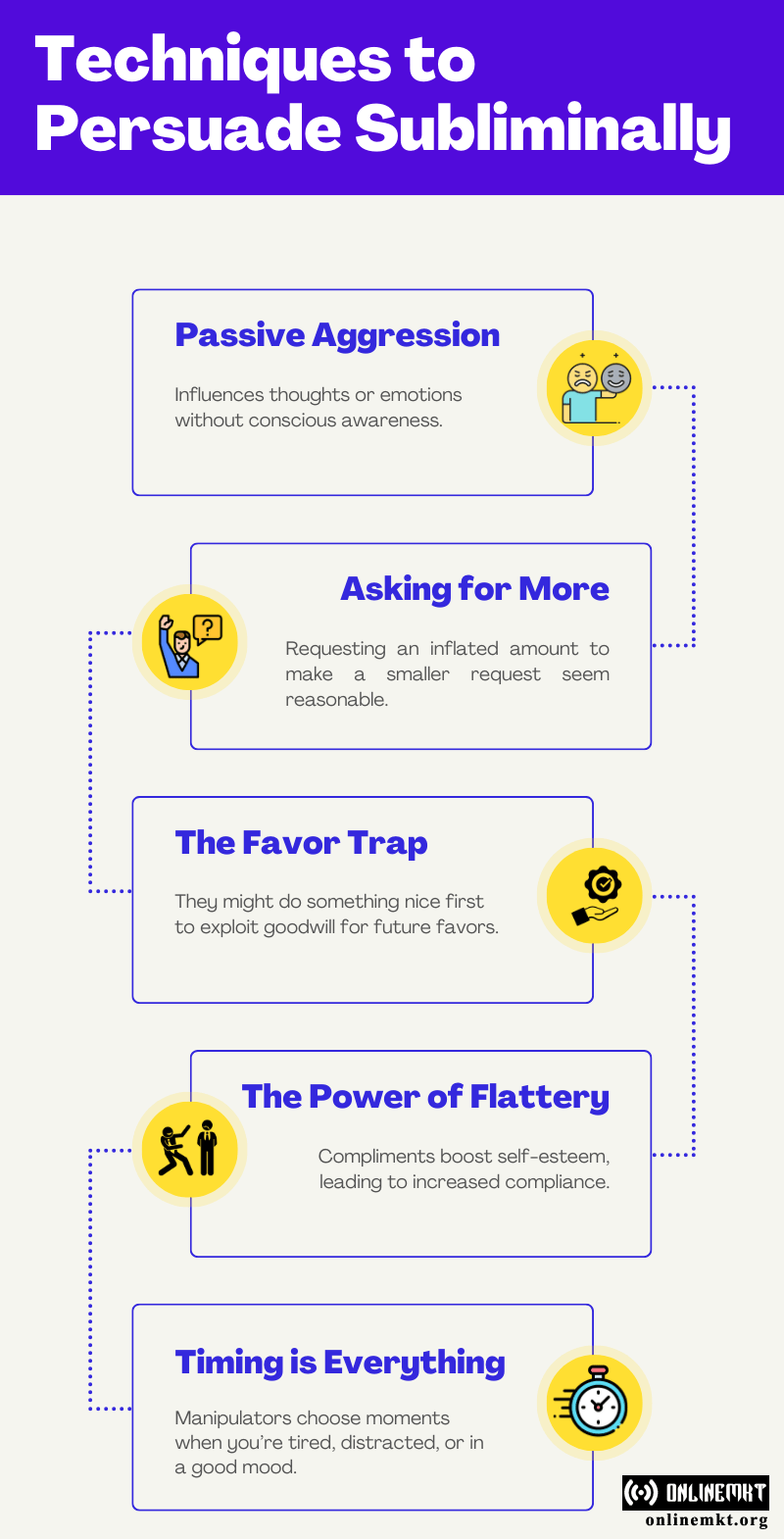How to Persuade Subliminally?

Can subtle signals control your choices?
Subliminal persuasion is the subtle art of influencing thoughts and behaviors without the person even realizing it. This technique dig into the subconscious, using gentle cues and hidden messages that can shape decisions in surprisingly powerful ways. Imagine guiding someone’s choices simply by tapping into the unseen triggers that resonate deep within them.
In a world brimming with information, mastering subliminal persuasion can give you a unique edge. Whether you want to elevate your marketing strategies, enhance your communication skills, or connect more deeply with others, the secrets of subliminal messaging hold the key.
Techniques to Persuade Subliminally
Even if you are unaware, it is likely you have been influenced subliminally at some point.
Passive Aggression
Passive aggression is a communication style where individuals express negative emotions indirectly rather than openly addressing their feelings. This behavior can manifest both verbally and nonverbally, often leaving others feeling confused or manipulated. The subtleness of passive-aggressive actions makes it challenging to identify, which can lead to a breakdown in relationships over time.
The insidious nature of passive aggression can lead to subliminal influences on others’ emotions and decisions. By creating an environment of uncertainty, passive-aggressive individuals can manipulate situations to their advantage without overt confrontation.
Passive aggression is a challenging persuasion tactic to counter. Those who employ it are often lost in their own private fantasies, making it hard for others to break free from their influence. They will never admit to using these deceptive tactics, leaving the victim trapped unless they recognize the manipulation and step away.
Asking for More
A common tactic used by subliminal persuaders is to ask for more than they actually need. For instance, someone might need $1,000 but knows that’s a significant sum to request. Instead of asking for that amount right away, they will request a much larger figure. This makes the original, lower request seem more reasonable by comparison, increasing the chances of compliance.
The person targeted by this technique may feel guilty for not giving more or even for not fulfilling the entire inflated request. Even if they have helped before, they might feel compelled to continue supporting the manipulator, often without realizing they have been subtly coerced.
The Favor Trap
Another method is the favor trap. Here, the manipulator asks for help in a way that makes the victim feel uniquely capable of providing it. It is not a direct command but rather a carefully crafted plea that plays on the victim’s desire to be helpful and kind.
In some cases, the manipulator might do something nice for the victim first, creating a sense of obligation. The victim then feels indebted and is more likely to fulfill the next request. By making it appear as though they genuinely need assistance, the manipulator exploits the victim’s goodwill to get what they want.
The Power of Flattery
Flattery is another powerful tool in subliminal persuasion. Manipulators know that making someone feel good about themselves can open doors to getting what they want. You can see this in children who use charm to sway adults or in more sinister situations where abusers build someone up only to tear them down and regain control.
Even when flattery is not entirely sincere, it can still make us feel smarter, more attractive, and stronger. This boost in self-esteem often leads people to comply with the manipulator’s wishes, believing they’re making their own decisions.
Timing is Everything
Lastly, manipulators carefully choose the best moment to make their requests. They will not ask when you’re well-rested and clear-headed. Instead, they will wait until you’re tired, distracted, or in a particularly good mood, knowing that you are more likely to agree when your defenses are down.
They are only interested in getting a favorable response, not in your well-being. So, they bide their time, waiting for the perfect moment to ask for what they want, ensuring that you are less likely to refuse.
Conclusion
Subliminal persuasion is a subtle yet powerful form of influence that can shape decisions, behaviors, and emotions without conscious awareness. Whether through passive aggression, inflated requests, flattery, or carefully timed appeals, manipulators know how to exploit our subconscious triggers. Understanding these tactics not only helps in recognizing when you are being influenced but also empowers you to guard against unwanted manipulation.